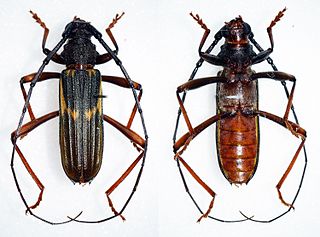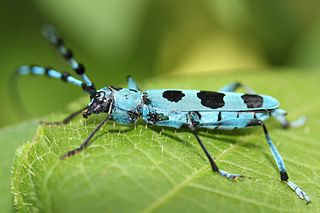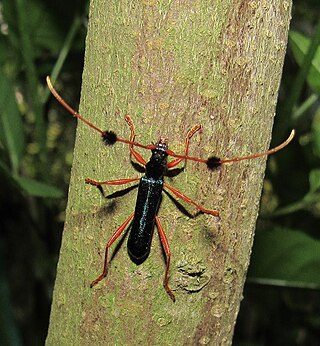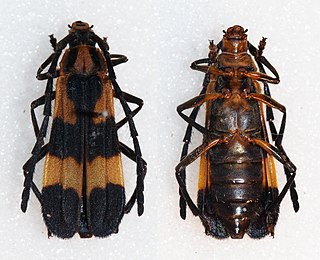
Achryson is a genus in the longhorn beetle family Cerambycidae. There are about 17 described species in Achryson, found mainly in the Neotropics.

Bothriospilini is a tribe of beetles in the subfamily Cerambycinae, containing 11 genera which have a primarily neotropical distribution. The tribe was proposed in 1950 by Brazilian entomologist Frederico Lane as a member of the new subfamily Bothriospilinae, and with Bothriospila assigned as the type genus. The tribe is morphologically close to the tribe Torneutini, with which it has in common the same shape of the last abdominal segment, which is wide and largely braided in the female, as well as the anterior thigh cavities that are open from behind and the laterally open medial cavity.
Scapanopygus cinereus is a species of beetle in the family Cerambycidae, the only species in the genus Scapanopygus. Both the genus and species were described in 1913 by French entomologist Pierre-Émile Gounelle. The type specimen was collected from Averías, a municipality in Argentina, on the banks of the Salado River.

Mionochroma is a genus of typical longhorn beetles in the family Cerambycidae. There are more than 20 described species in Mionochroma, found in the Neotropics.

Compsocerini is a tribe of beetles in the subfamily Cerambycinae, containing the following genera:
Caperonotus is a genus of typical longhorn beetles in the family Cerambycidae. There are at least four described species in Caperonotus, found in Brazil, Peru, and French Guiana.
Chaetosopus is a genus in the longhorn beetle family Cerambycidae. There are at least three described species in Chaetosopus, found in Brazil.
Chlorethe is a genus in the longhorn beetle family Cerambycidae. There are at least four described species in Chlorethe, found in South America.

Compsocerus is a genus of typical longhorn beetles in the family Cerambycidae. There are about seven described species in Compsocerus, found in South America.

Cosmoplatidius is a genus in the longhorn beetle family Cerambycidae. There are about five described species in Cosmoplatidius, found in Central and South America.
Ecoporanga is a genus of typical longhorn beetles in the family Cerambycidae. There are at least three described species in Ecoporanga, found in South America.
Goatacara is a genus of Long-Horned Beetles in the beetle family Cerambycidae. This genus has a single species, Goatacara boliviana, found in Bolivia.
Mimochariergus is a genus in the longhorn beetle family Cerambycidae. There are at least two described species in Mimochariergus, found in South America.
Upindauara is a genus of Long-Horned Beetles in the beetle family Cerambycidae. This genus has a single species, Upindauara bella, found in Brazil.

Pronuba is a genus of long-horned beetles in the family Cerambycidae. There are about five described species in Pronuba, found in Central and South America.
Compsocerus proximus is a species of Long-Horned Beetle in the beetle family Cerambycidae. It is found in Argentina, Bolivia, and Brazil.

Cosmoplatidius abare is a species in the longhorn beetle family Cerambycidae. It is found in Bolivia, Brazil, and Peru.
Dilocerus brunneus is a species in the longhorn beetle family Cerambycidae, found in Bolivia.
Dilocerus marinonii is a species in the longhorn beetle family Cerambycidae. It is found in Argentina and Bolivia.
Piola is a genus in the long-horned beetle family Cerambycidae. There are about six described species in Piola, found in the Neotropics.







